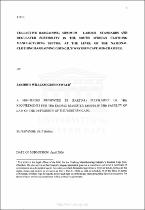| dc.contributor.advisor | Bolton, P | |
| dc.contributor.author | Groenwald, Jakobus William | |
| dc.date.accessioned | 2023-05-16T12:14:02Z | |
| dc.date.available | 2023-05-16T12:14:02Z | |
| dc.date.issued | 2006 | |
| dc.identifier.uri | http://hdl.handle.net/11394/10008 | |
| dc.description | Magister Legum - LLM | en_US |
| dc.description.abstract | In the context of a society in which there is an urgent need to create jobs, this research considers, firstly, whether the current labour regulatory environment is flexible enough to allow for an employment scenario that is conducive to job creation. The research then considers what is meant by the policy of 'regulated flexibility' and considers how flexibility operates in practice at NBC level. It is argued that the concept of flexibility is a misnomer - since it creates more problems than it solves. The research concludes with a call for real flexibility that will allow for increased investment and a greater supply of jobs. | en_US |
| dc.language.iso | en | en_US |
| dc.publisher | University of the Western Cape | en_US |
| dc.subject | SA economic policy | en_US |
| dc.subject | Job creation | en_US |
| dc.subject | Labour regulatory environment | en_US |
| dc.subject | Regulated flexibility | en_US |
| dc.subject | Exemptions | en_US |
| dc.title | Collective bargaining, minimum labour standards and regulated flexibility in the South African clothing manufacturing sector: at the level of the national clothing bargaining council's Western Cape sub-chamber | en_US |
| dc.type | Thesis | en_US |
| dc.rights.holder | University of the Western Cape | en_US |

